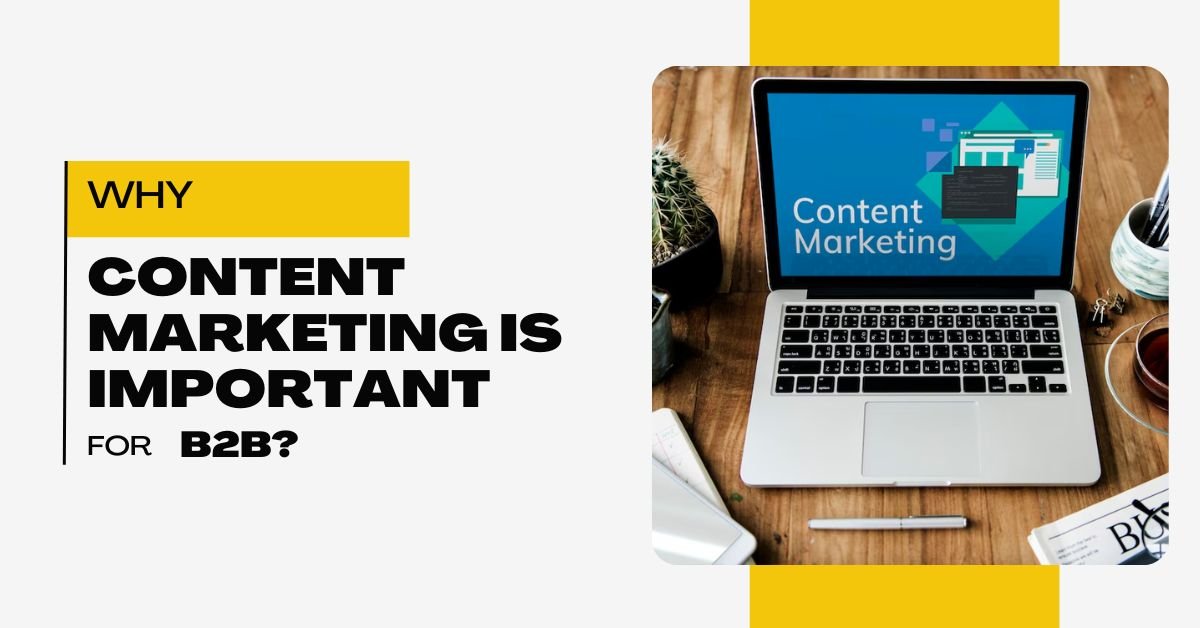Why Content Marketing is Important for B2B?
Connecting with the right audience is the key to success. This is especially true for B2B companies – businesses that sell products or services to other businesses. Unlike B2C (Business to Consumer), where companies sell to everyday customers, B2B focuses on building strong relationships with other businesses. And one of the most powerful tools to build these relationships is content marketing.
What is Content Marketing?
Content marketing is a way of creating and sharing useful information with your audience. Instead of directly selling a product, you provide helpful content that builds trust. This content can be in the form of:
- Blog posts
- Articles
- Videos
- Infographics
- Ebooks
- Case studies
- Emails
- Webinars
The goal is to educate, inform, and solve problems for your target audience. Over time, this builds a strong connection with potential customers and encourages them to do business with you.
Why is Content Marketing Important for B2B?
1. Builds Trust and Credibility
In B2B, decisions are not made in a hurry. Business buyers take time to research and compare before they choose a product or service. They want to work with companies they can trust.
Content marketing helps you become a trusted voice in your industry. When you regularly publish helpful and informative content, you show your audience that you understand their needs. You show them that you’re an expert. And that trust can lead to long-term business relationships.
2. Educates the Audience
Most B2B products or services are complex. Buyers want to understand how something works before making a decision. They may have questions like:
- How does this product help my business?
- What are the features and benefits?
- How is it better than other options?
Content marketing answers these questions. Through blogs, guides, or videos, you can educate your audience and help them make informed choices. The more they learn from your content, the more confident they become in choosing you.
3. Supports the Buyer’s Journey
In B2B, the buying journey has several steps. Buyers move through stages:
- Awareness: They realize they have a problem or need.
- Consideration: They start exploring solutions.
- Decision: They choose a provider.
Content marketing plays a role at every stage. For example:
- Blogs and infographics create awareness.
- Case studies and product comparisons help in the consideration stage.
- Webinars and demos assist in the decision-making.
By providing the right content at the right time, you guide the buyer smoothly through the journey.
4. Drives Quality Leads
Traditional marketing (like cold calls or random ads) can be expensive and may not always reach the right audience. Content marketing, on the other hand, attracts people who are already interested in your industry or product.
When people search for information online and find your content, they come to your website naturally. These are called inbound leads, and they are often more likely to convert because they found you when they needed help.
The result? You get better-quality leads who are already interested in what you offer.
5. Improves SEO and Online Visibility
Search engines like Google love fresh, helpful content. When you regularly publish blogs and articles, your website becomes more visible online. This is great for Search Engine Optimization (SEO).
Here’s how it helps:
- More content = more chances to rank on Google
- Helpful content gets shared and linked to
- You appear as an authority in your field
The better your SEO, the more traffic you get to your website. And more traffic means more chances to turn visitors into leads.
6. Builds Long-Term Value
One of the best things about content marketing is that it keeps working over time. A blog post you write today can bring in traffic for months or even years.
Unlike ads, which stop showing when you stop paying, content stays on your site. That means your content keeps helping potential customers long after it’s published. It’s a long-term investment that keeps giving returns.
7. Helps You Stand Out from Competitors
In a competitive market, it’s not enough to have a good product – you need to show why you’re better.
Content marketing helps you share your unique story. You can highlight your expertise, your values, your team, and your customer success stories. When your content connects with your audience, they’re more likely to remember your brand over others.
It gives your brand a personality and helps you stand out.
8. Builds Stronger Customer Relationships
B2B is all about relationships. Content marketing allows you to keep the connection going even after the first sale. You can continue to share helpful tips, industry news, and product updates.
This keeps your brand in your customer’s mind and increases the chance of repeat business. It also encourages happy clients to refer others to you.
9. Supports Other Marketing Efforts
Content is not just for blogs. The same content can be reused in different ways:
- Turn a blog post into a video
- Use content for social media posts
- Include it in your email newsletter
- Present it during a webinar
This way, content marketing supports all your other marketing efforts and makes them more effective.
10. Shows Real Results with Data
One great thing about content marketing is that you can track its performance. You can see:
- How many people are reading your blogs
- How long they stay on your site
- Which content brings the most leads
- What topics are most interesting to your audience
This helps you improve your strategy over time and focus on what works best.
Final Thoughts
In today’s digital world, content is more than just words. It’s the voice of your brand. For B2B companies, content marketing is not just helpful – it’s essential.
It builds trust, educates your audience, supports the buyer journey, and delivers long-term results. It helps you grow your online presence, attract the right leads, and create lasting business relationships.
If you’re a B2B company and haven’t started using content marketing yet, now is the time. Start small – maybe with a blog or a guide – and grow from there. The sooner you begin, the sooner you’ll see the value.
Also Read:
- How Content Marketing Drives Sales?
- What is the Primary Goal of Content Marketing?
- Do Digital Marketing Agencies Create Content?
- How Content Marketing is Changing the Game
- Content Marketing Tactics for B2B Companies
Frequently Asked Questions
What is content marketing in B2B?
Content marketing in B2B means creating and sharing useful content like blogs, videos, or guides to help other businesses learn about your services. Instead of directly selling, you focus on providing helpful information that builds trust and attracts companies who need your product or service.
How does content marketing help B2B growth?
Content marketing helps B2B growth by attracting the right businesses to your brand. It builds trust, educates potential customers, and supports them at each stage of their buying journey. Over time, this helps turn visitors into leads and leads into long-term business clients.
Why is content marketing better than ads?
Content marketing works better than ads in the long run because it keeps bringing people to your website even after it’s published. Ads stop showing when you stop paying. But helpful content stays on your site and keeps building value, trust, and traffic over time.
What type of content works best for B2B?
For B2B, the most effective content includes blog posts, case studies, whitepapers, videos, and educational guides. This kind of content helps business buyers understand your product, solve their problems, and make smart buying decisions. Content should always be helpful and focused on business needs.
Can content marketing bring quality leads?
Yes, content marketing brings high-quality leads because it attracts people who are already searching for information or solutions related to your business. These leads are more interested, informed, and likely to convert, making your marketing more cost-effective and successful over time.


